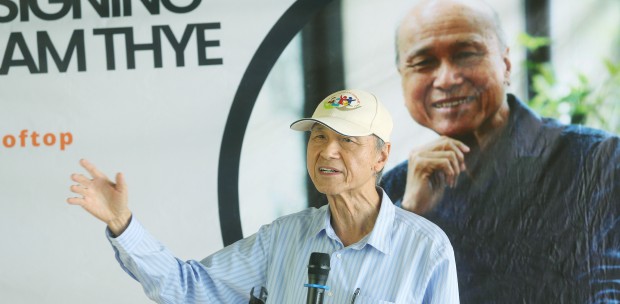I recently had dinner with Tan Sri Lee Lam Thye at a private club in Kuala Lumpur.
At an adjacent table was an Indian family from Penang, including two youngish lawyers.
Towards the end of their dinner, several of the younger family members, including the lawyers, came over to greet Lee. Such encounters with acquaintances and strangers are common for Lee.
From their words and body language, they obviously admired Lee. It can be assumed that many non-Chinese Malaysians admire Lee, particularly for the brand of politics he used to espouse. It can be argued that his politics transcended the race-based politics we are stuck with.
I caused some puzzlement, even from Lee, when I last wrote in this column that his is a story of "tragedy" that is emblematic of the Malaysian condition.
A prominent Malay journalist, who professed friendship and admiration of Lee, also asked why I called Lee's story a tragedy. I had thought it was obvious from the totality of what I earlier wrote about Lee. I should, however, not be surprised it was not obvious.
Only one friend I know, a Chinese, instinctively understood what I meant by "tragedy" in the Malaysian political context.
I explained thus to my Malay friend: "Tragedy that he (Lee) was the best DAP leader we never had! Nothing in our Constitution says our prime minister must be Malay. If a non-Malay one day becomes one, it will be a real cause for celebration if he had been elected leader of his multiracial party and then elected by voters…."
That was how Barack Obama and Rishi Sunak respectively became United States president and British prime minister. The remarkable rise of Obama was possible because he went out of the way to make himself non-threatening to the majority White American electorate, overcoming a two-century history of racial ostracism and animosity based on negative stereotyping.
It is equally a political tragedy in Malaysia because so few Malaysians even talk about the possibility of a non-Malay prime minister, with even many non-Malay Malaysians seemingly resigned to it never happening.
Ironically, it was a prominent Malay politician, Datuk Seri Mukhriz Mahathir, who in recent days broached this subject of a non-Malay prime minister.
Unsurprisingly, he linked it to the larger context of where non-Malay Malaysians fit in (or not) in the unending nation-building project.
Here, nothing currently looms larger — fortunately or otherwise — than the subject of national recognition of the United Examinations Certificate of Chinese vernacular schools for local university entrance.
Chinese Malaysians may justify the continued existence of vernacular schools as a constitutional right and, in more understated tones, state that they will not put their sons and daughters through a national school syllabus acknowledged to be flawed.
Now is as good a time as any for all Malaysians to acknowledge, as my Chinese friend said to me this week, "the elephant in the room".
Our nation-building project is deeply jeopardised if Malaysians of all races do not come together and grow up in common schools. Our divided school system can be compared with the disgraceful segregated school systems of old in the US.
Surely, strong political will (and goodwill) can be mustered by Malaysians of all races to agree on a single, common school syllabus that all can be proud of.
Only then can stubborn prejudices be broken down and inter-racial trust built up.
Over time, Malaysians of whatever colour or creed will learn not to feel threatened by each other.
A future political leader in the mould of Lee may then claim the mantle of Malaysia's first non-Malay prime minister and thus, the Malaysian "tragedy" will be banished once and for all.
The writer views developments in the nation, region and wider world from his vantage point in Kuching
The views expressed in this article are the author's own and do not necessarily reflect those of the New Straits Times






